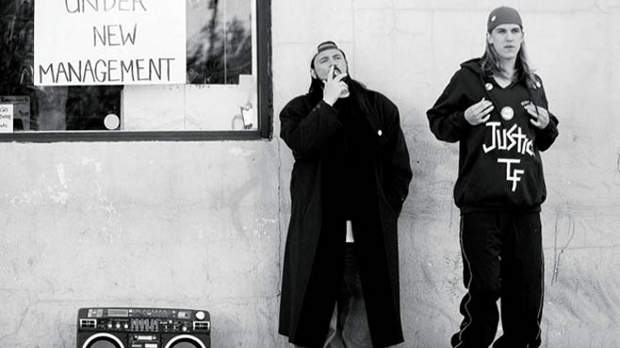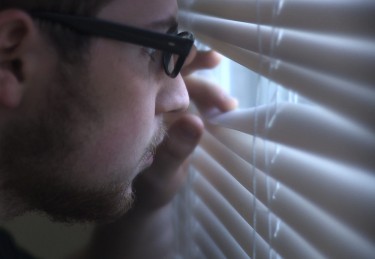 Back to selection
Back to selection
The Microbudget Conversation
We're Only Talking a Few Thousand Dollars by John Yost
The Micro-Budget Conversation : What is Micro ?
 Kevin Smith's Clerks
Kevin Smith's Clerks Here is the introduction to a series of posts from filmmaker John Yost on today’s micro-budget filmmaking scene. Check back each week for John’s conversations with various filmmakers debating issues related to the making and distribution of ultra-low-budget movies. — S.M.
What is micro-budget filmmaking? What makes a film micro-budget? Is it simply the amount of money spent? Is it the quality of the story, image, and sound? Is it a cliché at this point? Where did it come from? What about the word “indie”? Is “indie” just a buzz word now? Is the sky falling? Are we going to be able to make better films in the future as equipment and resources become cheaper? Who is going to help us show these stories once they’re finished?
This series will try to answer some of these questions by having current micro-budget filmmakers talk about their experiences with their own process and journey. We urge you to share thoughts in hopes of uniting the countless number of new talented filmmakers out there changing the face of independent cinema. The best way to do that is to exchange ideas, learn from each other’s mistakes, and support each other’s accomplishments. As the series progresses, each filmmaker included in this series will discuss a current aspect of “four to five figure budget” filmmaking and its effect on their process, the industry, and their lives. It is my hope to connect us all through our efforts to do something new and bold.
My name is John W. Yost and I was first introduced to the idea of filmmaking as a career after watching Kevin Smith’s Clerks. This may make me a walking cliché, but hear me out first. Unlike some other filmmakers, I did not grow up destined to make films at an early age. I never picked up a camera at the age of 3, and I certainly never watched a French New Wave film before I was 20. I grew up watching Hollywood films as fast as they could make them. My father was a photographer and I had no plans to follow him into the world of image making; I was going to be a meteorologist. But along came Clerks, Gummo, and Primer, and that was the end of science school. Those three films were my crash course in independent/art house filmmaking and I’ve been making films ever since.
If we forget the history of film for a second and look back to the beginning of the ’90s, then Clerks would be the first micro-budget of my generation. This film looked low budget and it didn’t care. Low budget was part of its charm — a huge reason why we all rallied behind it as young kids. It was vulgar, funny, and looked like something that, if we tried really hard, we could make, too. Then it goes on to launch the career of a kid who was just like us, and sparked a whole decade of filmmaking and books on filmmaking that put the emphasis on true DIY. It was the very foundation I built my filmmaking philosophies on, and I don’t think I’m alone. However, the world has changed, and even as it becomes easier to make another Clerks, it becomes harder to get it out there. I recently saw a clip of Kevin Smith saying that if Clerks were to go out to festivals today it would be rejected without fail. What does that say about the state of filmmaking today?

My recent filmmaking experience overlaps into most areas of the new world of indie filmmaking. Everything from DSLR photography, to Kickstarter campaigns, to the new Ultra Low Budget SAG contract (which is a bit of a pain in the ass, but worth it in the end). Orphaned is a giant basket of indie film potpourri — grassroots from the very beginning, and not ashamed of it. But when writing for this blog I could only think of the past that brought me to my third feature film, and the uncertainty I would face in the future. With my earlier few films I had nothing to lose and no agenda to get across. When IndiePix picked up the first one, and then funded the second one, I was confident it would lead somewhere, and that all I had to do was make the film I wanted to make. But as it became clear that The Brave and the Kind wasn’t a festival film, I began to doubt everything about my filmmaking abilities and the industry I was trying to become a part of. The past, for me, is paved with role models who worked hard, started indie, and were given a chance, or a career, to cultivate some of the best films ever made. I’m not that full of myself to think that just one micro-budget film was going to catapult me to some level I hadn’t earned. But, I had thought if I made the best film I could, with the resources I had, that eventually it would be noticed for its merits, reprimanded for its flaws, and lead to the next project. I would become part of the family that had (and still does) attracted me to filmmaking in the first place. However, I was now a filmmaker with a second feature that had garnered little response, fundraising for a third feature I now doubted I could make. Would people respond to the script, acting, and story? Would it be lost in the never-ending parade of million dollar “indie” films, or DIY quarter-of-a-million “micro-budget films”? Does the industry want to be a community any longer? Does it have room for new people, new ideas, and new styles? Does it have room for people trying to find their voice? If this is the last time I can raise money to make a film, is it the best I can do? Or, (and I love this life-affirming question the most), ”What the fuck am I doing? Should I just quit and go to work at the Apple Store?” But I didn’t stop, I pushed through the doubt and uncertainty and made the movie I wanted to make…again. Why? Because I think the truly great thing about micro-budget is that we are afforded the time and freedom to do what ever we want. That is worth more than money, fame, respect, or a career. To me it’s the embodiment of the true spirit of independent film.
However, after all is said and done I have gained tremendous perspective and feel blessed to be doing this at all. I will never stop making films. No matter what. You?
Cheers
John
P.S. We’d never turn down the chance to hear from you, especially micro-budget fans and filmmakers. To become part of the conversation you can send me your thoughts, responses, and questions at: braveandthekind AT gmail.com
